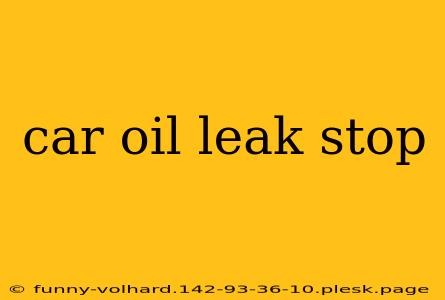A car oil leak is a serious issue that needs immediate attention. Ignoring it can lead to significant engine damage, costly repairs, and even a breakdown leaving you stranded. This comprehensive guide will explore the causes of oil leaks, how to identify them, and most importantly, how to stop that troublesome drip before it becomes a gushing torrent.
Identifying the Source of Your Oil Leak
Before you can fix an oil leak, you need to pinpoint its source. This often involves getting your hands a little dirty, but it's crucial for effective repair. Look for these telltale signs:
- Oil Stains: Check your garage floor or driveway for oil stains. The location of the stain can often indicate the general area of the leak.
- Visible Leaks: Carefully examine your engine compartment. Look for wet spots, oil dripping, or trails of oil leading to the source. Pay close attention to common leak points like the oil pan, valve cover gasket, and crankshaft seal.
- Oil Level Dip: Regularly check your engine oil level using the dipstick. A consistently decreasing oil level is a clear indicator of a leak.
- Low Oil Pressure Warning Light: If your oil pressure warning light illuminates, pull over immediately and shut off your engine. This signals critically low oil pressure, which can cause catastrophic engine damage.
Common Causes of Car Oil Leaks
Several components can be responsible for oil leaks. Understanding these common culprits will help you diagnose the problem accurately:
1. Oil Pan Gasket:
This gasket seals the oil pan to the engine block. A damaged or worn gasket is a frequent cause of oil leaks, often appearing as a slow drip from the bottom of the engine.
2. Valve Cover Gasket:
The valve cover gasket seals the valve cover, protecting the engine's internal components. Leaks here often manifest as oil around the top of the engine.
3. Crankshaft Seal:
This seal prevents oil from leaking from the crankshaft. Leaks from this seal can be more difficult to detect, but often result in oil around the front of the engine.
4. Oil Filter:
A loose or improperly installed oil filter can lead to leaks. Check the oil filter and ensure it's securely tightened.
5. Worn Engine Seals:
Over time, various seals within the engine can wear out, leading to oil leaks. These often require more extensive repairs.
Stopping the Oil Leak: Solutions and Considerations
The best way to stop an oil leak depends on its source and severity.
- Minor Leaks (e.g., from a slightly loose oil filter or minor gasket weeping): These might be fixable with a simple tightening or replacement of a component. However, always ensure correct tightening torque to avoid damaging parts.
- Significant Leaks (e.g., large oil stains, continuous dripping): These typically require professional attention and more involved repairs such as gasket replacement or seal replacement. Ignoring significant leaks can cause irreparable damage to your engine.
- Using Stop Leak Additives: While stop leak additives might offer a temporary solution for minor leaks, they are not a long-term fix and can potentially clog engine components. They should be considered a last resort and only used as directed.
When to Seek Professional Help
If you are uncomfortable performing repairs yourself, or if the leak is substantial, it's crucial to seek professional help from a qualified mechanic. They have the expertise and tools to diagnose the problem accurately and perform the necessary repairs safely and effectively. Attempting complex repairs yourself without the proper knowledge and tools can lead to further damage and increase repair costs.
This guide provides a starting point for diagnosing and addressing car oil leaks. Remember, regular maintenance and timely repairs are vital for keeping your vehicle running smoothly and avoiding costly breakdowns. Prioritize your car’s health—a small leak today can become a major problem tomorrow.

